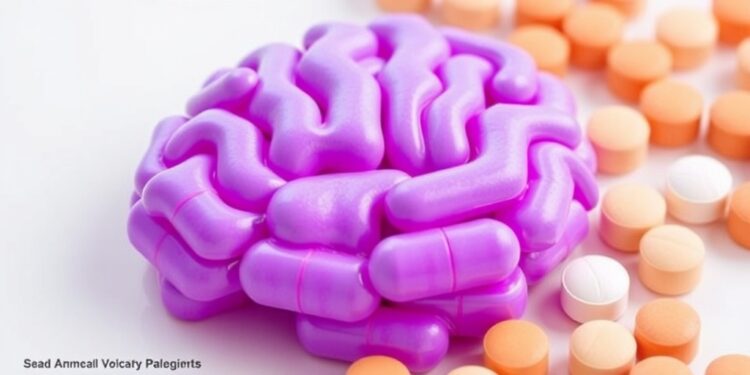
New research reveals concerning insights into the impact of antidepressants on cognitive decline among dementia patients, suggesting that these widely prescribed medications might exacerbate the very symptoms they aim to alleviate. Published in the influential journal BMC Medicine, this observational study draws upon a vast dataset from the Swedish Dementia Registry (SveDem), showcasing the need for a reevaluation of treatment strategies for individuals suffering from dementia. As the population ages and the prevalence of dementia increases, understanding the relationship between pharmacological interventions and cognitive health is more crucial than ever.
The study elucidates that while antidepressants are often deployed to manage the debilitating symptoms associated with dementia—such as anxiety, depression, aggressive behavior, and insomnia—evidence now indicates that these medications may accelerate cognitive deterioration. Through meticulous data analysis involving over 18,000 patients, researchers discovered a significant correlation between antidepressant use and the rate of cognitive decline in individuals diagnosed with dementia. Alarmingly, about 23 percent of the study’s participants were found to be receiving antidepressant treatment, highlighting the extent of this issue.
Participants in this comprehensive study were monitored over time, and data comparisons revealed that those treated with antidepressants exhibited a markedly faster decline in cognitive function when juxtaposed with non-medicated individuals. Notably, the observational nature of the research leaves room for ambiguity regarding whether the cognitive decline is a direct effect of the medications or a byproduct of underlying depressive symptoms. This distinction is vital, as health professionals strive to formulate treatment plans that strike a balance between managing distressing symptoms and preserving cognitive health.
Within the realm of antidepressants, distinctions were observed regarding their impact on cognitive decline. The study highlighted that selective serotonin reuptake inhibitors, or SSRIs, constituted approximately 65 percent of the antidepressant prescriptions recorded. Among these, the SSRI escitalopram was linked to the most rapid cognitive decline, indicating that certain medications may be more detrimental than others. Sertraline and citalopram also contributed to significant cognitive impairment, reinforcing the notion that some antidepressants come with notable risks.
Conversely, alternative antidepressants like mirtazapine, which employs a different mechanism of action, were associated with less pronounced cognitive deterioration. This suggests a potential avenue for developing tailored treatments for dementia patients, as clinicians weigh the benefits and risks of various antidepressant options. As researchers delve deeper into the study’s findings, the objective is to identify specific patient demographics that may have varied responses to antidepressant treatments—potentially leading to more individualized care strategies that prioritize cognitive preservation.
The implications of these findings are profound, as millions of patients with dementia rely on antidepressants to improve their quality of life. The research underscores the necessity for healthcare providers to rethink approaches when prescribing these medications. More informed decisions could help mitigate the accelerated decline often observed in treated patients, leading to better outcomes and enhanced quality of life for these vulnerable individuals.
Sara Garcia Ptacek, the lead author of the study, emphasizes the importance of addressing depressive symptoms to improve overall wellbeing in dementia patients. Nevertheless, she notes the urgency for healthcare professionals to also consider the cognitive repercussions of the medications prescribed. The dual aims of alleviating distressing symptoms while safeguarding cognitive function must be meticulously balanced in clinical practice.
As society grapples with the increasing incidence of dementia, the research highlights a pressing need for continued examination of treatment modalities. The objective is not solely focused on symptom relief but also on preserving cognitive integrity for as long as possible. Future studies may investigate how different demographic factors, such as age, gender, and type of dementia, influence a patient’s response to various antidepressants, potentially ushering in a new era of personalized medicine.
The enduring impact of these findings reverberates beyond the immediate realm of pharmacological treatment, ultimately prompting discussions surrounding holistic care approaches. Integrating mental health support, cognitive therapies, and lifestyle modifications alongside pharmacological treatments may yield synergistic benefits that enhance the overall health of dementia patients. This multifaceted approach could emerge as a cornerstone of contemporary dementia care.
In light of the research’s revelations, further investigations into the long-term effects of antidepressant use in diverse populations are warranted. Understanding the nuance of how these medications interact with cognitive function may inform guidelines for best practices in both prescribing and monitoring the treatment of dementia-related symptoms.
In conclusion, while antidepressants remain a critical tool for managing emotional distress in dementia patients, the association with accelerated cognitive decline urges a reevaluation of their use. The findings from this large cohort study serve as a clarion call for healthcare professionals to adopt a more cautious and informed framework regarding antidepressant prescriptions, ensuring a commitment to the cognitive health of one of society’s most vulnerable populations.
Subject of Research: People
Article Title: Antidepressant use and cognitive decline in patients with dementia: a national cohort study
News Publication Date: 24-Feb-2025
Web References: http://dx.doi.org/10.1186/s12916-025-03851-3
References: BMC Medicine, published February 2025
Image Credits: N/A
Keywords: Dementia, Antidepressants, Cognitive decline, SSRIs, Mirtazapine, Depressive symptoms, Observational study, Personalized medicine, Pharmacological treatment, Holistic care approaches, Mental health support, Cognitive therapies.
Tags: age-related cognitive deteriorationantidepressants and cognitive declinecognitive health in elderly patientsdementia patient treatment strategiesimpact of antidepressants on dementiamanaging anxiety and depression in dementiamental health in dementia careobservational study on dementia medicationspharmacological interventions for dementiareevaluation of antidepressant userelationship between antidepressants and dementia symptomsSwedish Dementia Registry research





